MGT2321 Essay: Analyzing Traditional and Effectuation Entrepreneurship
VerifiedAdded on 2022/08/12
|7
|1375
|66
Essay
AI Summary
This essay provides a comprehensive analysis of entrepreneurship, contrasting the traditional and effectuation approaches. It begins by defining entrepreneurship and highlighting the role of entrepreneurs in launching new businesses. The essay then delves into the core differences between traditional entrepreneurship, which emphasizes control and risk-taking, and effectuation, a process-oriented approach focused on leveraging available resources and controlling the future. The five principles of effectuation—Bird-in-hand, Affordable loss, Lemonade, Patchwork quilt, and Pilot-in-the-plane—are described in detail, emphasizing their importance in shaping the unpredictable future of entrepreneurial ventures. The essay draws on the work of Sarasvathy (2001) and other relevant sources to support its arguments, concluding with a summary of the key takeaways regarding the evolution of entrepreneurship.
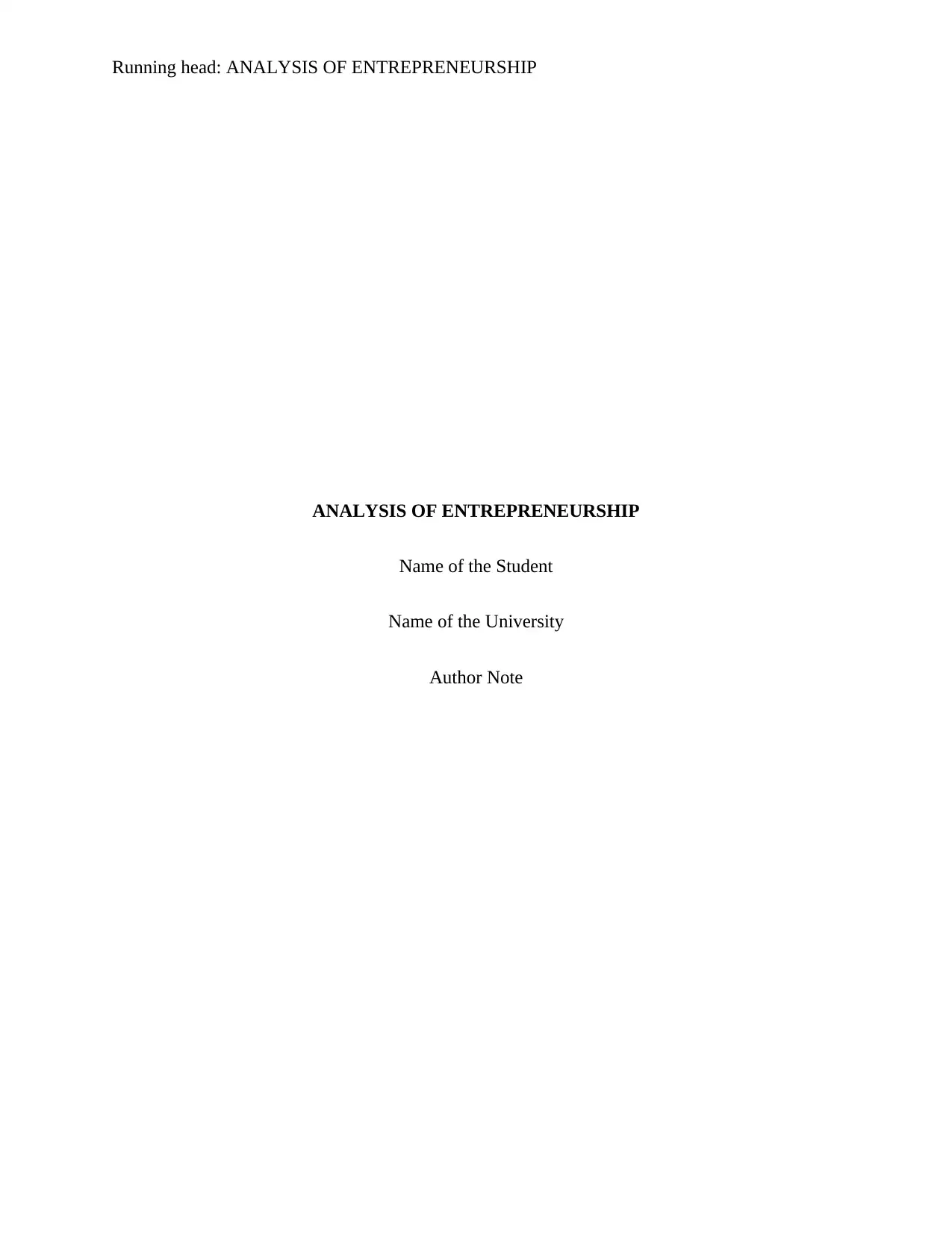
Running head: ANALYSIS OF ENTREPRENEURSHIP
ANALYSIS OF ENTREPRENEURSHIP
Name of the Student
Name of the University
Author Note
ANALYSIS OF ENTREPRENEURSHIP
Name of the Student
Name of the University
Author Note
Paraphrase This Document
Need a fresh take? Get an instant paraphrase of this document with our AI Paraphraser
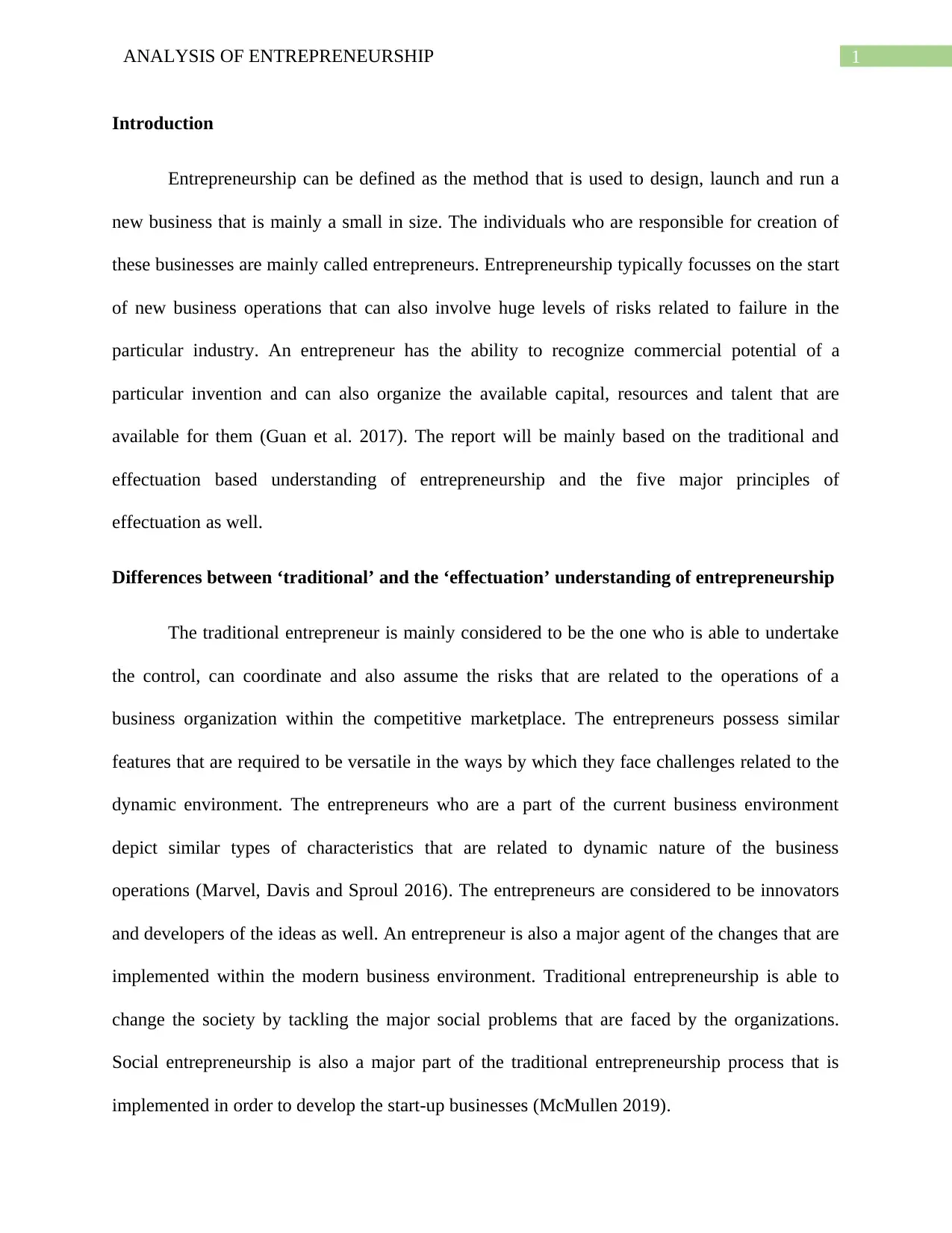
1ANALYSIS OF ENTREPRENEURSHIP
Introduction
Entrepreneurship can be defined as the method that is used to design, launch and run a
new business that is mainly a small in size. The individuals who are responsible for creation of
these businesses are mainly called entrepreneurs. Entrepreneurship typically focusses on the start
of new business operations that can also involve huge levels of risks related to failure in the
particular industry. An entrepreneur has the ability to recognize commercial potential of a
particular invention and can also organize the available capital, resources and talent that are
available for them (Guan et al. 2017). The report will be mainly based on the traditional and
effectuation based understanding of entrepreneurship and the five major principles of
effectuation as well.
Differences between ‘traditional’ and the ‘effectuation’ understanding of entrepreneurship
The traditional entrepreneur is mainly considered to be the one who is able to undertake
the control, can coordinate and also assume the risks that are related to the operations of a
business organization within the competitive marketplace. The entrepreneurs possess similar
features that are required to be versatile in the ways by which they face challenges related to the
dynamic environment. The entrepreneurs who are a part of the current business environment
depict similar types of characteristics that are related to dynamic nature of the business
operations (Marvel, Davis and Sproul 2016). The entrepreneurs are considered to be innovators
and developers of the ideas as well. An entrepreneur is also a major agent of the changes that are
implemented within the modern business environment. Traditional entrepreneurship is able to
change the society by tackling the major social problems that are faced by the organizations.
Social entrepreneurship is also a major part of the traditional entrepreneurship process that is
implemented in order to develop the start-up businesses (McMullen 2019).
Introduction
Entrepreneurship can be defined as the method that is used to design, launch and run a
new business that is mainly a small in size. The individuals who are responsible for creation of
these businesses are mainly called entrepreneurs. Entrepreneurship typically focusses on the start
of new business operations that can also involve huge levels of risks related to failure in the
particular industry. An entrepreneur has the ability to recognize commercial potential of a
particular invention and can also organize the available capital, resources and talent that are
available for them (Guan et al. 2017). The report will be mainly based on the traditional and
effectuation based understanding of entrepreneurship and the five major principles of
effectuation as well.
Differences between ‘traditional’ and the ‘effectuation’ understanding of entrepreneurship
The traditional entrepreneur is mainly considered to be the one who is able to undertake
the control, can coordinate and also assume the risks that are related to the operations of a
business organization within the competitive marketplace. The entrepreneurs possess similar
features that are required to be versatile in the ways by which they face challenges related to the
dynamic environment. The entrepreneurs who are a part of the current business environment
depict similar types of characteristics that are related to dynamic nature of the business
operations (Marvel, Davis and Sproul 2016). The entrepreneurs are considered to be innovators
and developers of the ideas as well. An entrepreneur is also a major agent of the changes that are
implemented within the modern business environment. Traditional entrepreneurship is able to
change the society by tackling the major social problems that are faced by the organizations.
Social entrepreneurship is also a major part of the traditional entrepreneurship process that is
implemented in order to develop the start-up businesses (McMullen 2019).
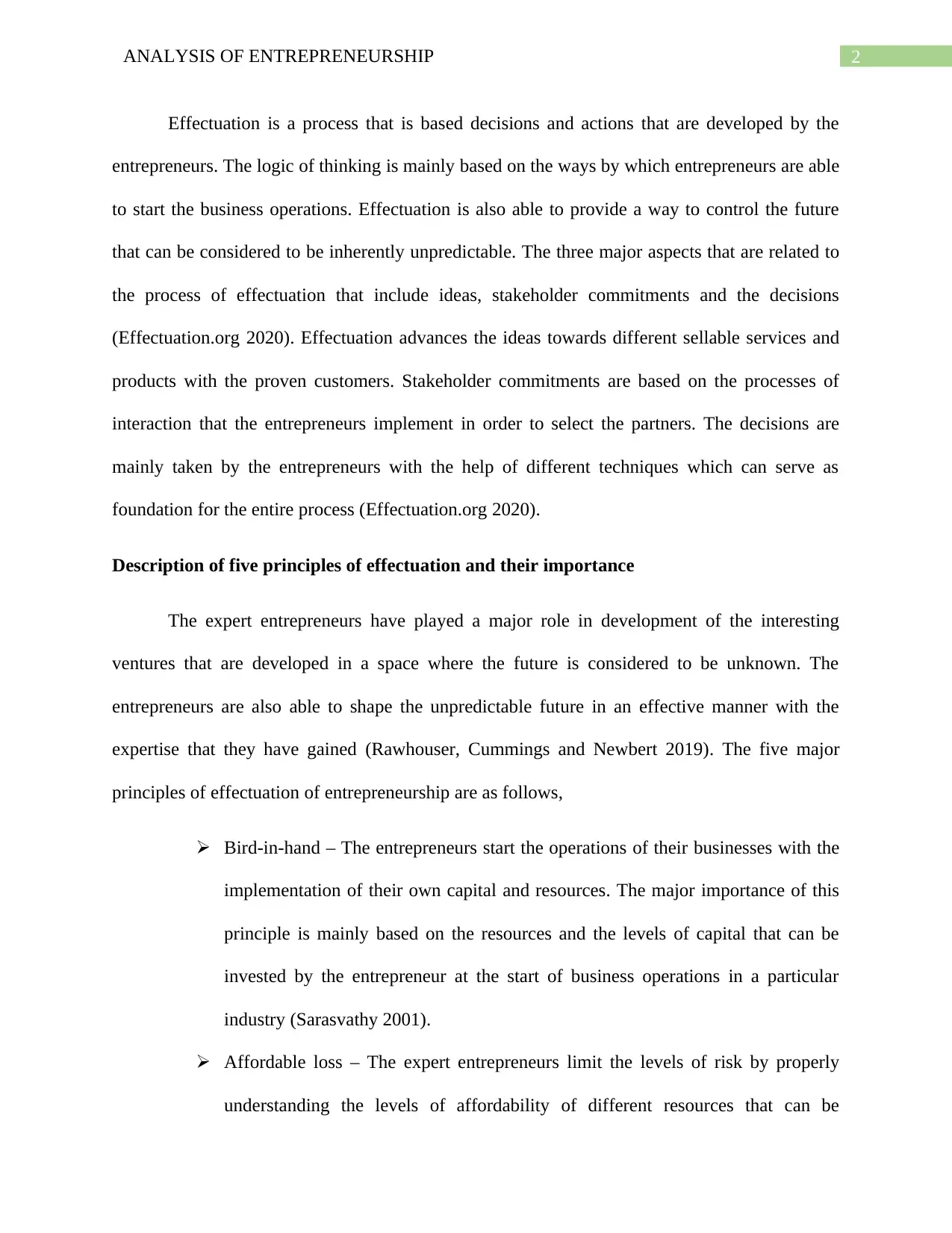
2ANALYSIS OF ENTREPRENEURSHIP
Effectuation is a process that is based decisions and actions that are developed by the
entrepreneurs. The logic of thinking is mainly based on the ways by which entrepreneurs are able
to start the business operations. Effectuation is also able to provide a way to control the future
that can be considered to be inherently unpredictable. The three major aspects that are related to
the process of effectuation that include ideas, stakeholder commitments and the decisions
(Effectuation.org 2020). Effectuation advances the ideas towards different sellable services and
products with the proven customers. Stakeholder commitments are based on the processes of
interaction that the entrepreneurs implement in order to select the partners. The decisions are
mainly taken by the entrepreneurs with the help of different techniques which can serve as
foundation for the entire process (Effectuation.org 2020).
Description of five principles of effectuation and their importance
The expert entrepreneurs have played a major role in development of the interesting
ventures that are developed in a space where the future is considered to be unknown. The
entrepreneurs are also able to shape the unpredictable future in an effective manner with the
expertise that they have gained (Rawhouser, Cummings and Newbert 2019). The five major
principles of effectuation of entrepreneurship are as follows,
Bird-in-hand – The entrepreneurs start the operations of their businesses with the
implementation of their own capital and resources. The major importance of this
principle is mainly based on the resources and the levels of capital that can be
invested by the entrepreneur at the start of business operations in a particular
industry (Sarasvathy 2001).
Affordable loss – The expert entrepreneurs limit the levels of risk by properly
understanding the levels of affordability of different resources that can be
Effectuation is a process that is based decisions and actions that are developed by the
entrepreneurs. The logic of thinking is mainly based on the ways by which entrepreneurs are able
to start the business operations. Effectuation is also able to provide a way to control the future
that can be considered to be inherently unpredictable. The three major aspects that are related to
the process of effectuation that include ideas, stakeholder commitments and the decisions
(Effectuation.org 2020). Effectuation advances the ideas towards different sellable services and
products with the proven customers. Stakeholder commitments are based on the processes of
interaction that the entrepreneurs implement in order to select the partners. The decisions are
mainly taken by the entrepreneurs with the help of different techniques which can serve as
foundation for the entire process (Effectuation.org 2020).
Description of five principles of effectuation and their importance
The expert entrepreneurs have played a major role in development of the interesting
ventures that are developed in a space where the future is considered to be unknown. The
entrepreneurs are also able to shape the unpredictable future in an effective manner with the
expertise that they have gained (Rawhouser, Cummings and Newbert 2019). The five major
principles of effectuation of entrepreneurship are as follows,
Bird-in-hand – The entrepreneurs start the operations of their businesses with the
implementation of their own capital and resources. The major importance of this
principle is mainly based on the resources and the levels of capital that can be
invested by the entrepreneur at the start of business operations in a particular
industry (Sarasvathy 2001).
Affordable loss – The expert entrepreneurs limit the levels of risk by properly
understanding the levels of affordability of different resources that can be
⊘ This is a preview!⊘
Do you want full access?
Subscribe today to unlock all pages.

Trusted by 1+ million students worldwide
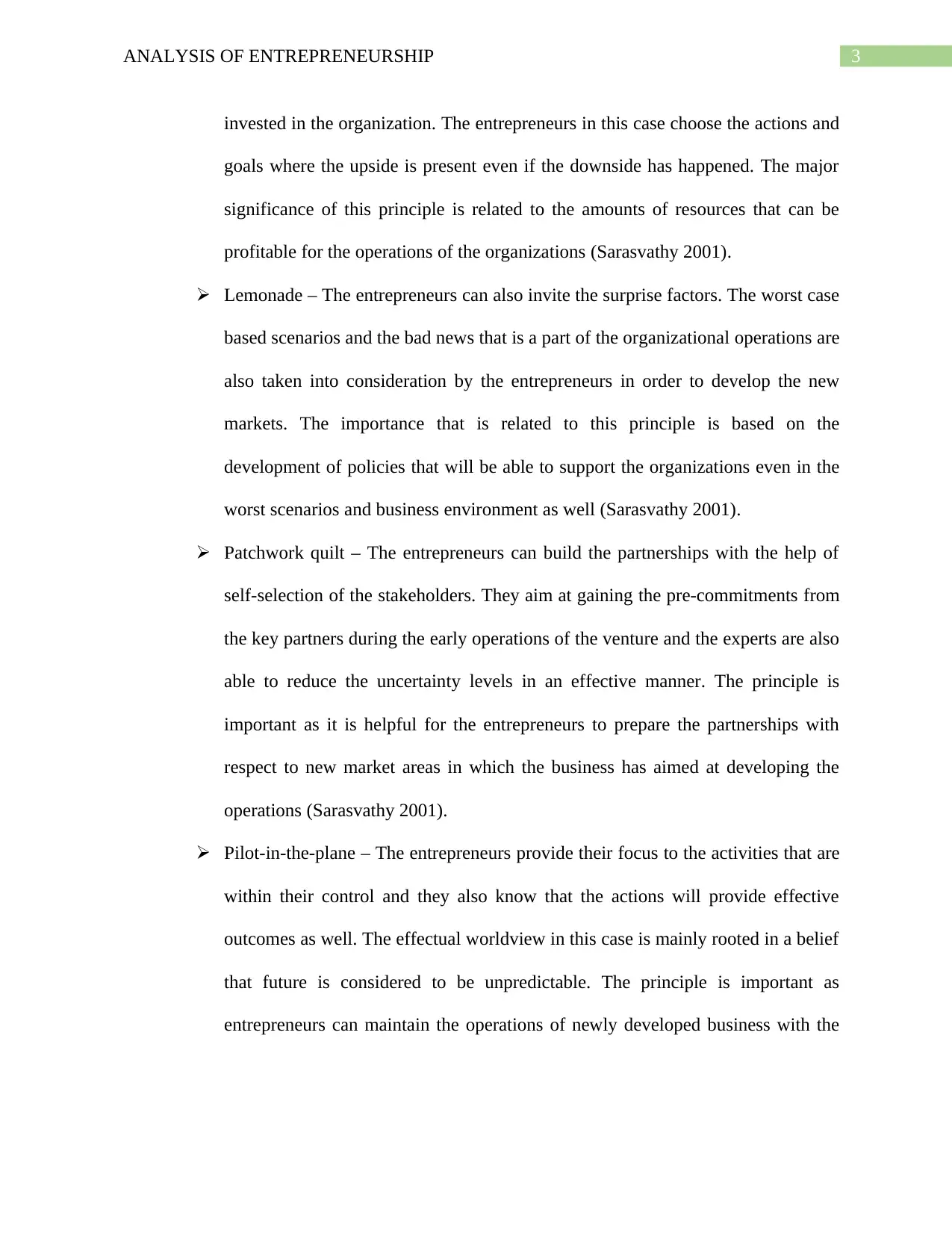
3ANALYSIS OF ENTREPRENEURSHIP
invested in the organization. The entrepreneurs in this case choose the actions and
goals where the upside is present even if the downside has happened. The major
significance of this principle is related to the amounts of resources that can be
profitable for the operations of the organizations (Sarasvathy 2001).
Lemonade – The entrepreneurs can also invite the surprise factors. The worst case
based scenarios and the bad news that is a part of the organizational operations are
also taken into consideration by the entrepreneurs in order to develop the new
markets. The importance that is related to this principle is based on the
development of policies that will be able to support the organizations even in the
worst scenarios and business environment as well (Sarasvathy 2001).
Patchwork quilt – The entrepreneurs can build the partnerships with the help of
self-selection of the stakeholders. They aim at gaining the pre-commitments from
the key partners during the early operations of the venture and the experts are also
able to reduce the uncertainty levels in an effective manner. The principle is
important as it is helpful for the entrepreneurs to prepare the partnerships with
respect to new market areas in which the business has aimed at developing the
operations (Sarasvathy 2001).
Pilot-in-the-plane – The entrepreneurs provide their focus to the activities that are
within their control and they also know that the actions will provide effective
outcomes as well. The effectual worldview in this case is mainly rooted in a belief
that future is considered to be unpredictable. The principle is important as
entrepreneurs can maintain the operations of newly developed business with the
invested in the organization. The entrepreneurs in this case choose the actions and
goals where the upside is present even if the downside has happened. The major
significance of this principle is related to the amounts of resources that can be
profitable for the operations of the organizations (Sarasvathy 2001).
Lemonade – The entrepreneurs can also invite the surprise factors. The worst case
based scenarios and the bad news that is a part of the organizational operations are
also taken into consideration by the entrepreneurs in order to develop the new
markets. The importance that is related to this principle is based on the
development of policies that will be able to support the organizations even in the
worst scenarios and business environment as well (Sarasvathy 2001).
Patchwork quilt – The entrepreneurs can build the partnerships with the help of
self-selection of the stakeholders. They aim at gaining the pre-commitments from
the key partners during the early operations of the venture and the experts are also
able to reduce the uncertainty levels in an effective manner. The principle is
important as it is helpful for the entrepreneurs to prepare the partnerships with
respect to new market areas in which the business has aimed at developing the
operations (Sarasvathy 2001).
Pilot-in-the-plane – The entrepreneurs provide their focus to the activities that are
within their control and they also know that the actions will provide effective
outcomes as well. The effectual worldview in this case is mainly rooted in a belief
that future is considered to be unpredictable. The principle is important as
entrepreneurs can maintain the operations of newly developed business with the
Paraphrase This Document
Need a fresh take? Get an instant paraphrase of this document with our AI Paraphraser
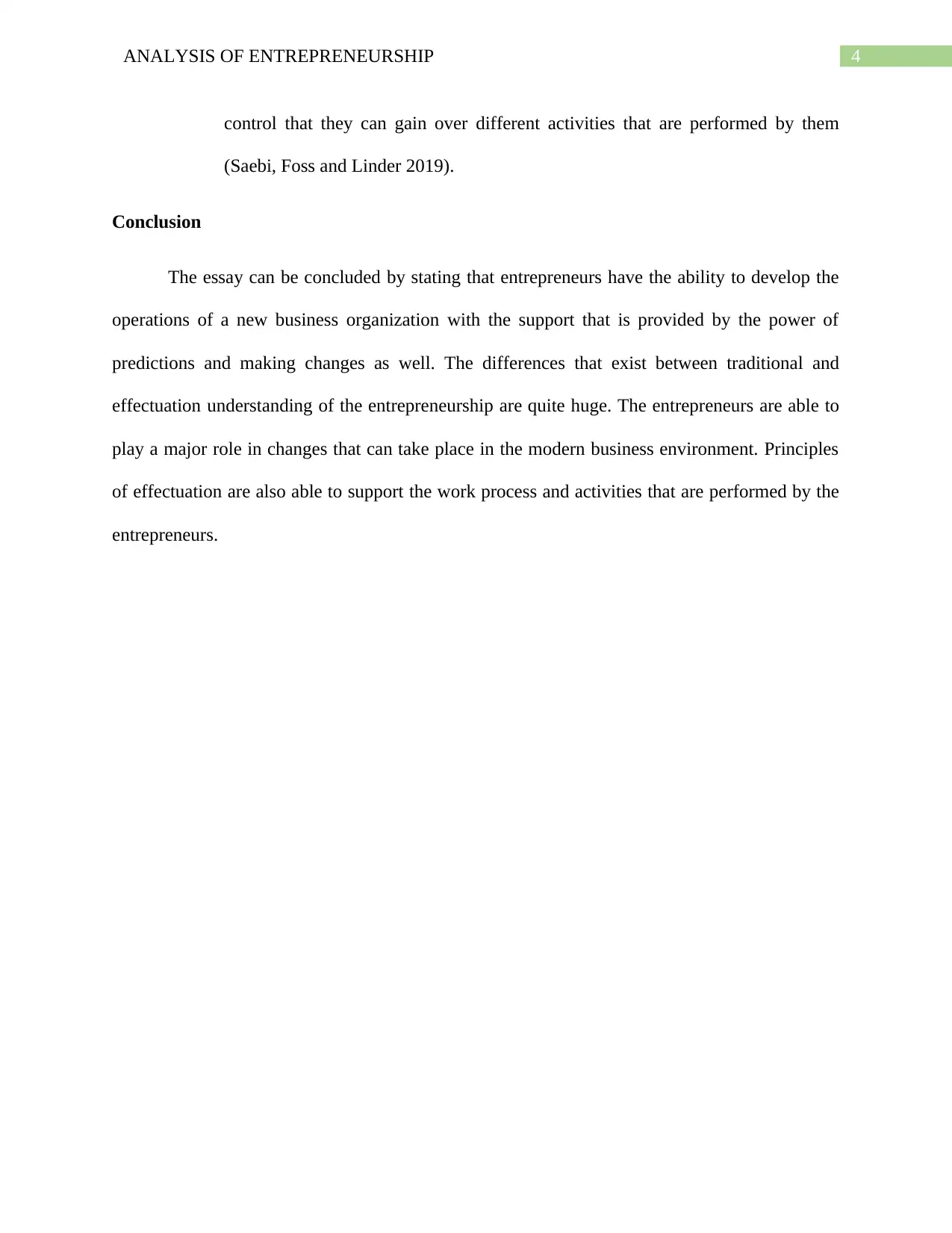
4ANALYSIS OF ENTREPRENEURSHIP
control that they can gain over different activities that are performed by them
(Saebi, Foss and Linder 2019).
Conclusion
The essay can be concluded by stating that entrepreneurs have the ability to develop the
operations of a new business organization with the support that is provided by the power of
predictions and making changes as well. The differences that exist between traditional and
effectuation understanding of the entrepreneurship are quite huge. The entrepreneurs are able to
play a major role in changes that can take place in the modern business environment. Principles
of effectuation are also able to support the work process and activities that are performed by the
entrepreneurs.
control that they can gain over different activities that are performed by them
(Saebi, Foss and Linder 2019).
Conclusion
The essay can be concluded by stating that entrepreneurs have the ability to develop the
operations of a new business organization with the support that is provided by the power of
predictions and making changes as well. The differences that exist between traditional and
effectuation understanding of the entrepreneurship are quite huge. The entrepreneurs are able to
play a major role in changes that can take place in the modern business environment. Principles
of effectuation are also able to support the work process and activities that are performed by the
entrepreneurs.
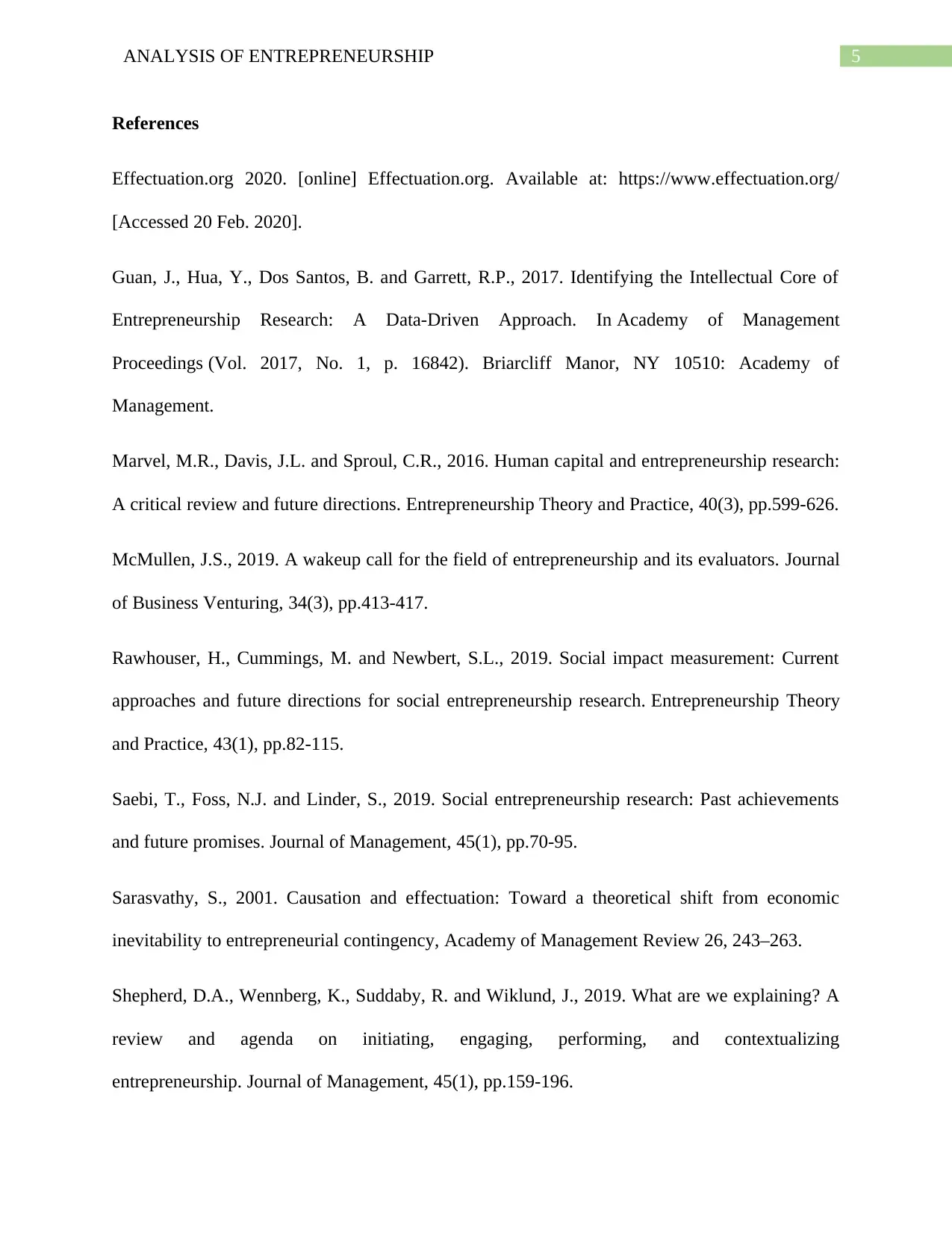
5ANALYSIS OF ENTREPRENEURSHIP
References
Effectuation.org 2020. [online] Effectuation.org. Available at: https://www.effectuation.org/
[Accessed 20 Feb. 2020].
Guan, J., Hua, Y., Dos Santos, B. and Garrett, R.P., 2017. Identifying the Intellectual Core of
Entrepreneurship Research: A Data-Driven Approach. In Academy of Management
Proceedings (Vol. 2017, No. 1, p. 16842). Briarcliff Manor, NY 10510: Academy of
Management.
Marvel, M.R., Davis, J.L. and Sproul, C.R., 2016. Human capital and entrepreneurship research:
A critical review and future directions. Entrepreneurship Theory and Practice, 40(3), pp.599-626.
McMullen, J.S., 2019. A wakeup call for the field of entrepreneurship and its evaluators. Journal
of Business Venturing, 34(3), pp.413-417.
Rawhouser, H., Cummings, M. and Newbert, S.L., 2019. Social impact measurement: Current
approaches and future directions for social entrepreneurship research. Entrepreneurship Theory
and Practice, 43(1), pp.82-115.
Saebi, T., Foss, N.J. and Linder, S., 2019. Social entrepreneurship research: Past achievements
and future promises. Journal of Management, 45(1), pp.70-95.
Sarasvathy, S., 2001. Causation and effectuation: Toward a theoretical shift from economic
inevitability to entrepreneurial contingency, Academy of Management Review 26, 243–263.
Shepherd, D.A., Wennberg, K., Suddaby, R. and Wiklund, J., 2019. What are we explaining? A
review and agenda on initiating, engaging, performing, and contextualizing
entrepreneurship. Journal of Management, 45(1), pp.159-196.
References
Effectuation.org 2020. [online] Effectuation.org. Available at: https://www.effectuation.org/
[Accessed 20 Feb. 2020].
Guan, J., Hua, Y., Dos Santos, B. and Garrett, R.P., 2017. Identifying the Intellectual Core of
Entrepreneurship Research: A Data-Driven Approach. In Academy of Management
Proceedings (Vol. 2017, No. 1, p. 16842). Briarcliff Manor, NY 10510: Academy of
Management.
Marvel, M.R., Davis, J.L. and Sproul, C.R., 2016. Human capital and entrepreneurship research:
A critical review and future directions. Entrepreneurship Theory and Practice, 40(3), pp.599-626.
McMullen, J.S., 2019. A wakeup call for the field of entrepreneurship and its evaluators. Journal
of Business Venturing, 34(3), pp.413-417.
Rawhouser, H., Cummings, M. and Newbert, S.L., 2019. Social impact measurement: Current
approaches and future directions for social entrepreneurship research. Entrepreneurship Theory
and Practice, 43(1), pp.82-115.
Saebi, T., Foss, N.J. and Linder, S., 2019. Social entrepreneurship research: Past achievements
and future promises. Journal of Management, 45(1), pp.70-95.
Sarasvathy, S., 2001. Causation and effectuation: Toward a theoretical shift from economic
inevitability to entrepreneurial contingency, Academy of Management Review 26, 243–263.
Shepherd, D.A., Wennberg, K., Suddaby, R. and Wiklund, J., 2019. What are we explaining? A
review and agenda on initiating, engaging, performing, and contextualizing
entrepreneurship. Journal of Management, 45(1), pp.159-196.
⊘ This is a preview!⊘
Do you want full access?
Subscribe today to unlock all pages.

Trusted by 1+ million students worldwide

6ANALYSIS OF ENTREPRENEURSHIP
1 out of 7
Related Documents
Your All-in-One AI-Powered Toolkit for Academic Success.
+13062052269
info@desklib.com
Available 24*7 on WhatsApp / Email
![[object Object]](/_next/static/media/star-bottom.7253800d.svg)
Unlock your academic potential
Copyright © 2020–2026 A2Z Services. All Rights Reserved. Developed and managed by ZUCOL.




